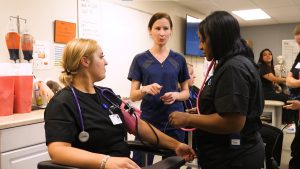15 Ways Medical Assistants Are Vital To Health Care
April 27, 2015
Medical Assistants: What do they do?
The duties for medical assistants may vary with the specialty and size of the practice. Many medical assistants perform dual functions with both administrative and clinical tasks. This is particularly true in small, private medical practices where they have many responsibilities out of necessity.
Some of the functions medical assistants perform include:
- Administering injections as directed by the physician
- Assisting patients with insurance forms
- Authorizing drug refills and providing prescription information to pharmacies
- Cleaning and sterilizing instruments and disposing of contaminated supplies
- Collecting blood, tissue, or other laboratory specimens, log the specimens, and prepare them for testing
- Completing patient billing
- Explaining treatment procedures or physicians’ instructions to patients
- Helping the physician with patient examinations
- Interview patients to obtain medical information and measure their vital signs, weight, and height
- Performing routine laboratory tests and sample analyses
- Preparing treatment rooms for patient examinations
- Preparing and administering medications as directed by a physician
- Recording patients’ medical history, vital statistics, and information such as test results in medical records
- Scheduling patient appointments
- Showing patients to examination rooms and prepare them for the physician
Where do medical assistants work?
Medical assistants work for medical practices of all kinds, from private practices to clinics to large hospitals. Doctors, nurses and patients all depend upon the professionals in medical assisting jobs to accurately complete their responsibilities.
The job outlook for medical assistants
Medical assisting is one of the fastest growing occupations in the country. The Bureau of Labor Statistics* estimates that the number of medical assistant jobs will increase by 29% by 2022. This can be attributed to several factors, including the increasing average age of the U.S. residents who require more procedures; federal legislation (the Affordable Care Act) will increase the number of insured people in the country; as medical practices switch to electronic health records, medical assistants responsibilities will continue to change.
Are you ready for a new career?
Medical assistants are necessary for many health practices to operate at peak efficiency. Because they have so many responsibilities, the right training and education are absolutely essential. If you are interested in a rewarding career in the growing health care industry and would like to know more about First Institute’s Medical Assisting Program, call 815-459-3500.
* Source: Bureau of Labor Statistics, U.S. Department of Labor, Occupational Outlook Handbook, 2014-15 Edition, at http://www.bls.gov/ooh/healthcare/medical-assistants.htm

